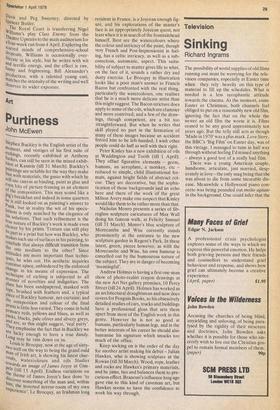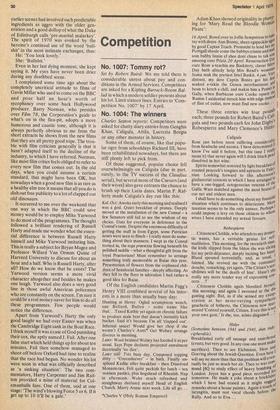Television
Sinking
Richard Ingrams
The possibility of world supplies of old films running out must be worrying for the television companies, especially at Easter time when they rely heavily on this type of material to fill up the schedules. What is needed is a less sycophantic attitude towards the cinema. At the moment, come Easter or Christmas, both channels feel obliged to put on a reasonably new old film, ignoring the fact that on the whole the newer an old film the worse it is. Films ceased to be any good approximately, ten years ago. But the telly still acts as though 'Made in 1970' was a plus mark. Love Story, the BBC's 'Big Film' on Easter day, was of this vintage. I managed to tune in half way through without feeling I'd missed anything — always a good test of a really bad film.
There was a young American couple, handsome, articulate, just married, desperately in love —the only snag being that she was about to die from some incurable disease. Meanwhile a Hollywood piano concerto was being pounded out molto agitato in the background. One could infer that the
earlier scenes had involved such predictable ingredients as aggro with the older gen eration and a good dollop of what the Duke of Edinburgh calls 'pre-marital malarkey'. The spirit of 1970 was evoked by the heroine's continual use of the word 'bullshit' in the most intimate exchanges, thus: He: 'You look lovely.'
She: 'Bullshit.'
Even in her last dying moment, she kept saying it. My eyes have never been drier during any deathbed scene.
I complained some time ago about the completely uncritical attitude to films of Gavin Millar who used to come on the BBC
and pour half an hour's worth of sycophancy over some hack Hollywood producer. Barry Norman, who presides over Film 78, the Corporation's guide to
what's on in the flea-pit, adopts a more humorous and caustic tone, although it is always perfectly obvious to me from the short extracts he shows from the new films that they are all pretty good tripe. The trouble with film criticism generally is that it hasn't adapted itself to the decline of the industry, to which I have referred. Norman, like most film critics feels obliged to refer to every new film that comes out. In the old days, when you could assume a certain standard, that might have been OK, but nowadays when a good new film is as rare as a healthy elm tree it means that all you do is dish out free publicity to a lot of clapped out old dinosaurs.
It occurred to me over the weekend that one way in which the BBC could save money would be to employ Mike Yarwood to do most of the programmes. The thought followed a brilliant rendering of Russell Harty and made me wonder what the essential difference is between Russell Harty himself and Mike Yarwood imitating him. This is really a subject for Bryan Magee and Professor Willard Van Orman Quine of Harvard University to discuss for about an hour and a half. Who is Russell Harty, after all? How do we know that he exists? The Yarwood version seems a more vivid character altogether and besides he makes one laugh. Yarwood also does a very good line in those awful American policemen who are constantly on the screen. I'm sure it could be a real money-saver for him to do all these programmes. Few people would notice the difference.
Apart from Yarwood's Harty the only good laught we had over Easter was when the Cambridge Eight sank in the Boat Race. I think myself it was a case of God punishing their cox, the aptly named J. Fail. After one false start which held things up for about ten minutes, Fail then somehow managed to shoot off before Oxford had time to realise that the race had begun. No wonder his lot were soon in what was officially described as 'a sinking situation'. The two commentators, Harry Carpenter and Jim Railton provided a mine of material for Colemanballs fans. One of them, said at one stage: 'The wind's blowing Force 5 or 6. ff it get up to 10 it'll be a gale.'



































 Previous page
Previous page